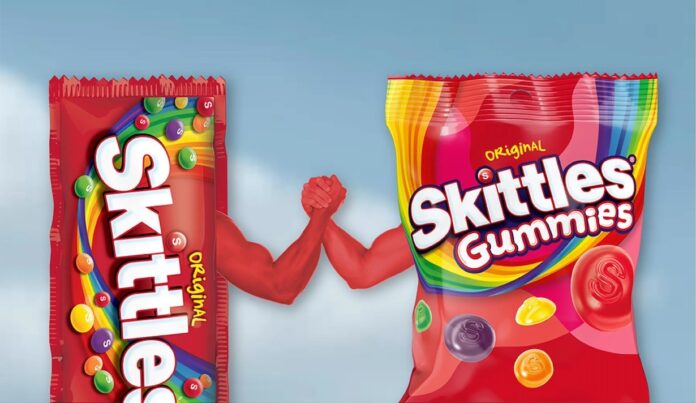- Mars Wrigley plans to remove synthetic colors from popular candies by 2026.
- Initial naturally colored products include M&M’s, Skittles, Starburst, and Extra Gum.
- Move aligns with health concerns, consumer demand, and growing industry trends.
In a move that’s sure to delight parents and candy lovers alike, Mars Wrigley North America has announced that some of its most beloved treats will soon be free of synthetic colors. By 2026, fans of Skittles, M&M’s, Starburst, and Extra Gum will be able to enjoy these products without any artificial Food, Drug & Cosmetic (FD&C) colors, the company confirmed last month.
The announcement marks a major step for one of the world’s largest candy makers. Mars Wrigley said its first naturally colored offerings will include M\&M’s Chocolate, Skittles Original, Extra Gum Spearmint, and Starburst Original fruit chews. For decades, these treats have been recognized as the quintessential rainbow-hued snacks, and the move to remove artificial dyes signals a significant change in the candy aisle.
A Science-Led, Consumer-Focused Approach
“Mars Wrigley North America has been on an innovation journey over the past few years, focused on providing products that give consumers delicious choices,” the company stated in a press release. “We are closely engaged with regulators and aware of the growing conversation about food colors. All our products already meet the strict standards set by authorities around the world, including the FDA.”
Anton Vincent, president of Mars Wrigley North America, emphasized that the initiative is both consumer-focused and science-led. He noted that company experts are carefully exploring natural alternatives that meet strict safety criteria while still delivering the colors and textures people expect from their favorite treats. “Once we identify a fully effective, scalable solution, we will update consumers on timing and specific product commitments,” he said.
The announcement places Mars Wrigley at the forefront of a growing movement among major consumer goods companies to offer naturally colored alternatives. For many, this change isn’t just cosmetic—it reflects increasing concerns about the health effects of synthetic dyes.
Pressure Mounts From Health Advocates and Government Officials
The timing of Mars Wrigley’s announcement coincides with a wider push from U.S. Health and Human Services officials to reduce synthetic food additives. Secretary Robert F. Kennedy Jr. has made the removal of artificial dyes a key initiative in his campaign to “Make America Healthy Again.” Kennedy has repeatedly highlighted that many synthetic dyes are petroleum-based, provide no nutritional value, and could pose unnecessary health risks.
In a June statement, Kennedy praised efforts to approve safe, natural color alternatives, emphasizing that these changes help families make healthier choices. “For too long, our food system has relied on synthetic dyes that offer no nutritional benefit and carry potential risks. Removing them supports healthier diets and safer food options for children,” he said.
The federal initiative follows a wave of similar commitments from major food manufacturers. Kraft Heinz and General Mills recently announced plans to phase out artificial colors from certain products over the next two years. Other companies, including PepsiCo, Hershey, Nestlé USA, ConAgra, J.M. Smucker, and McCormick, have made comparable pledges in recent months. The trend signals a notable shift in the industry, suggesting that naturally colored foods may soon become the standard rather than the exception.
Scientific Debate Over Synthetic Dyes
Concerns over artificial food dyes are not new. Certain synthetic colors, such as Red No. 3 and Red No. 40, have been under scrutiny for years. In 2025, the FDA banned Red No. 3 after studies linked it to cancer in animals, requiring its removal from foods by 2027. Red No. 40, commonly used in candy and snacks, is also under examination. While the FDA emphasizes that the cancer link observed in Red No. 3 does not apply to humans, some limited studies suggest artificial dyes may affect behavior, including hyperactivity and attention in children.
Dr. Kantha Shelke, founder of food science research firm Corvus Blue, told ABC News that removing these dyes from diets has sometimes led to observable improvements in behavior and focus in children. Still, major regulatory bodies, including the Environmental Protection Agency and the World Health Organization, classify Red No. 40 as a “low concern,” noting that the typical amount consumed in diets is unlikely to cause harm.
Despite the debate, parents and advocacy groups have applauded Mars Wrigley’s move. Social media reactions have ranged from excitement to cautious optimism, with many expressing hope that naturally colored candies will become widely available without sacrificing taste or enjoyment. Some critics, however, have questioned whether the new colors will match the vibrancy of the originals.
A Cultural Shift in Candy Choices
For candy lovers, the change raises interesting questions. Will children embrace the new colors as eagerly as the old ones? Can Skittles maintain its iconic rainbow appeal without synthetic dyes? Industry experts argue that taste and familiarity will likely win the day. Natural colors—derived from fruits, vegetables, and other plant sources—have come a long way in recent years, achieving hues that are vibrant and appealing.
The shift also reflects broader consumer trends. More people are seeking cleaner labels and ingredients they can recognize. Health-conscious parents are reading ingredient lists more closely than ever, scrutinizing artificial additives and dyes. By offering naturally colored options, Mars Wrigley is aligning its products with evolving consumer expectations while maintaining its classic candy experience.




